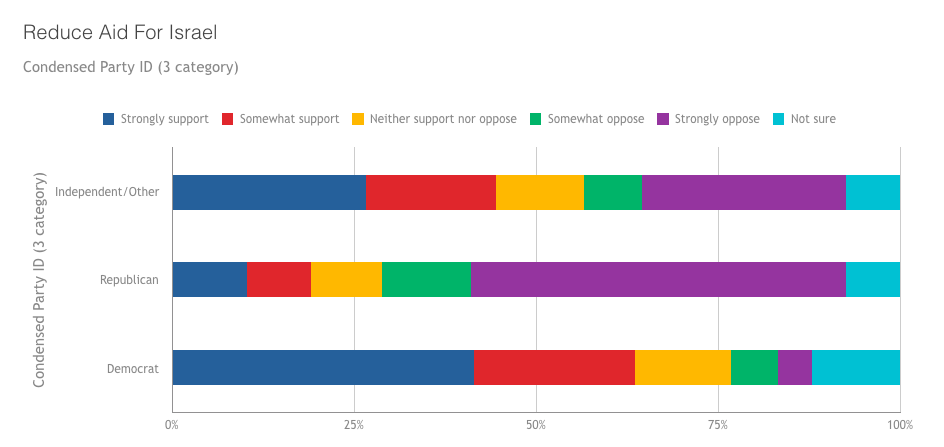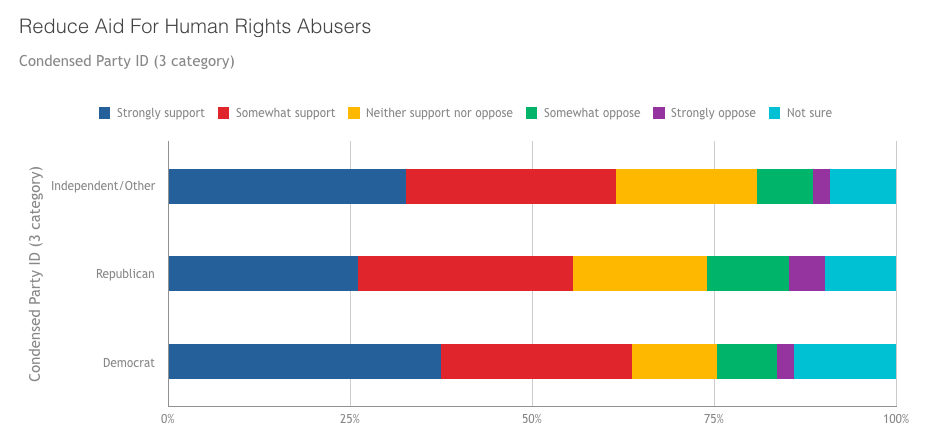Poll: Democratic Voters Support Cutting Aid to Israel
A new report from Data for Progress shows that there’s room for the primary candidates to move left.

NEW POLLING DATA commissioned by the progressive organization Data for Progress shows that a plurality of US voters support reducing military aid to Israel based on its violations of Palestinian human rights. When asked about support for reducing military aid to governments that abuse human rights in general, even more voters are in favor, and fewer are opposed.
Currently, Israel receives $3.3 billion in military aid and $500 million in missile defense funds each year, an arrangement laid out in a 2016 memorandum of understanding signed by the Obama administration and the government of Israel. Progressives in the Democratic Party—including Reps. Ilhan Omar, Mark Pocan, and Alexandria Ocasio-Cortez—have raised the possibility of reducing US military aid in response to Israel’s policies toward Palestinians. This rift between progressives and Israel was only further exacerbated after Israeli Prime Minister Benjamin Netanyahu barred Omar and Rep. Rashida Tlaib from visiting Israel and the West Bank in August, prompting angry pushback from top Democrats.
The Data for Progress report accompanying the new poll, which I authored, includes detailed profiles of the records of the five leading contenders in the Democratic presidential primary field with regard to Israel. Of these five, only Bernie Sanders has endorsed the possibility of using US aid to Israel as leverage toward a negotiated solution with the Palestinians. After Netanyahu barred Tlaib and Omar from visiting Israel and the West Bank, Sanders went further, tweeting: “If Israel doesn’t want members of the United States Congress to visit their country, maybe they can respectfully decline the billions of dollars that we give to Israel.” Pete Buttigieg has said that if Netanyahu were to annex parts of the West Bank, “a President Buttigieg would take steps to ensure American taxpayers won’t help foot the bill.”
The other frontrunners have stayed well within the parameters of the dying bipartisan consensus on Israel. Joe Biden, whose involvement with the US–Israel relationship goes back more than 45 years, has said he would wield pressure on the Israeli government “in terms of what they can and cannot do relative to what is accepted internationally”; he has also campaigned on the 2016 aid deal as an Obama administration accomplishment. Elizabeth Warren has promised to pressure Netanyahu to end the occupation, but the only policy proposal she has advanced is a return to the Obama administration’s negotiations-focused approach. Kamala Harris doesn’t even go that far: she has campaigned this year on her opposition to the Obama administration’s mild rebuke of Israel over settlement construction at the United Nations in 2016.

YouGov Blue fielded an online poll for Data for Progress based on a national sample of 1,380 US voters from August 15th–21st. As a Data for Progress senior fellow (working independently from IfNotNow, the anti-occupation organization I co-founded), I drafted two questions for the poll on the topic of US foreign military aid—one that spoke to a global context, and one that focused on Israel specifically. The questions presented a strong case for both the pro and con arguments:
- In the past, the US has cut military aid to foreign governments accused of human rights violations. Supporters of the cuts say the US shouldn’t be involved in human rights abuses and it’s a waste of taxpayer money. Opponents say that even if some governments have imperfect records, we need to do what is necessary to fight terrorism and to counter foreign powers like Russia and China. Do you [support or oppose] the US government reducing foreign and military aid to governments engaged in human rights abuses?
- Israel is one of the largest recipients of US military aid. Some legislators in the United States say that aid should be reduced because Israel often violates the human rights of Palestinians by using lethal military force against unarmed Palestinian civilians, including children. Other legislators in the United States say aid should not be reduced; Israel does what it needs to do to protect itself from terrorism and hostile foreign powers, who deliberately provoke Israel with violence. Do you [support or oppose] the US government reducing foreign and military aid to Israel based on human rights violations?
These questions were among a battery of other questions asked in a randomized order, so that some participants were asked the general military aid question before the question about Israel, while others answered the Israel question first.
The poll found that voters support reducing aid to Israel for human rights reasons by an 11% margin: 45% support the policy, and 34% oppose. The margin of support for reducing aid to governments that engage in human rights violations in general is even higher, at 49%: 61% of voters support it, while 12% oppose.

A closer look at the data reveals some clear patterns. Republicans, and especially those who identify as “very conservative,” hold Israel to a different standard than they hold recipients of US military aid in general. Democrats, on the other hand, support reducing aid to Israel for human rights abuses at the same rate they support cutting aid to any government engaged in violations of human rights. Democratic voters responded to both questions with a high degree of consistency and majority net support.
Respondents who self-identified as Democrats support reducing military aid to human rights abusers in general at a rate of 64% in favor versus 11% opposed, meaning that a net majority of Democratic voters, 53%, support the policy of reducing military aid to governments engaged in violations of human rights.
Respondents who reported voting for a Democratic congressional candidate in 2018 answered the questions with a similar degree of consistency and slightly higher levels of support: 66% support reducing aid to human rights abusers and 11% oppose it; 67% support reducing aid to Israel on the basis of human rights and 10% oppose it.
Overall, a net majority of Democratic voters support reducing military aid to Israel and to other governments engaged in human rights abuses. Democratic voters’ responses regarding US military aid to Israel and US military aid to any government engaged in human rights violations are nearly identical. These results suggest that Democratic voters are not holding Israel to a different standard than they would hold any other recipient of US military aid dollars. They also suggest that Democratic politicians who float the possibility of changes to the US–Israel aid relationship do so with the support of their party’s voters.
Republican voters, on the other hand, answered the question about military aid to human rights abusers and the question about military aid to Israel very differently.
Respondents who identified themselves as Republicans support reducing US military aid to human rights abusers in general at a somewhat lower rate than Democrats. The policy has the support of a net 40% of self-identified Republicans: 56% of these voters support reducing US military aid to human rights abusers, and 16% oppose it. Respondents who report voting for a Republican candidate in 2018 support the policy at a net rate of 43%, with 57% supporting versus 14% opposing.
On Israel, however, Republican opinion looks dramatically different from Democratic opinion. Self-identified Republicans oppose reducing military aid to Israel for human rights reasons by a 45% margin: 19% of Republican voters support the policy, while 64% oppose it. Respondents who report voting for a Republican candidate last year oppose the policy by an even larger margin: while 18% of these voters support the policy, 68% oppose it—a net support level of negative 50%.
The answers of self-identified Independent or “other party” voters landed between those of Democrats and Republicans. (Given that 38% of self-identified Independents in the sample reported voting for a Democrat in 2018, while 40% reported voting for a Republican, this is not surprising.) Regarding reducing US military aid to human rights abusers in general, a net 51% of Independents support the policy: 61% support the policy and 10% oppose it. On aid to Israel, the net support rate is 9%: 45% of self-identified Independents support reducing aid to Israel based on human rights abuses, while 36% oppose the policy.
Self-reported ideology—on the flawed, but still useful scale of “very liberal” to “very conservative”—is the trait most correlated with support or opposition to reducing military aid to Israel on the basis of human rights.
Voters who self-identify as “very conservative” oppose reducing aid to Israel on a human rights basis by a staggering margin of 65%: 77% of very conservative voters oppose the policy (and 66% strongly oppose), while 11% support it. For comparison, very conservative voters support reducing aid to human rights abusers generally by a 40% margin: 56% support the policy and 16% oppose it. “Very conservative” voters make up 14% of the sample in this poll; 89% of them report voting for a Republican congressional candidate in 2018, 90% of them are white, and 57% of them are born-again/evangelical Christians.
Self-identified “conservative” voters oppose human-rights based reduction in aid to Israel by a margin of 49%: 19% of conservative voters support the policy, while 68% oppose it (including 55% who strongly oppose). These voters support reducing aid to human rights abusers in general, 55% to 15%—again, a 40% margin in favor. Conservative voters made up 18% of the sample; 83% of them voted for Republicans in 2018, 88% of them are white, and 39% of them are born-again/evangelical Christians.
Reducing aid to Israel for human rights reasons has the net support of 18% of self-described “moderate” voters: 45% of moderate voters support it while 28% oppose the policy. (Moderates also had the highest percentage of “neither support nor oppose” and “not sure” responses on this question: 27% of moderates fell into one of these two categories.) Moderate voters support reducing aid to human rights abusers in general by a 50% margin: 61% in favor, 11% opposed. Moderate voters are 30% of the sample; in 2018, 54% of them report voting for a Democratic congressional candidate, while 31% voted for a Republican candidate. The racial makeup of moderate voters in the sample is 67% white, and 33% are people of color; 26% of them are born-again/evangelical Christians.
Voters who self-describe as “liberal” support reducing aid to Israel for human rights reasons, 66% (including 40% who strongly support) to 10%—a 56% margin. Liberal voters support reducing aid to human rights abusers in general by a 50-point margin; 63% of liberal voters support the policy while 13% oppose it. (The slight differences here and in the “very liberal” subgroup between the general poll and the Israel-focused poll suggest that there is a very small group of liberal voters who do support reducing aid to Israel but do not support reducing aid to governments that violate human rights in general.) These voters are 19% of the sample polled. Of them, 92% report voting for a Democratic congressional candidate in 2018; 65% of them are white, and 35% are people of color; 10% of them are born-again/evangelical Christians.
Among self-identified “very liberal” voters, 81% support reducing aid to Israel based on human rights abuses, including 63% who strongly support the policy; only 4% oppose it. Very liberal voters support reducing aid to Israel by a 77% margin. On the general question of reducing aid to human rights abusers, 76% of very liberal voters responded in favor, while 7% opposed the policy, for a margin of 69%. Very liberal voters made up 15% of the sample. Of them, 89% report voting for a Democratic congressional candidate in 2018; 75% of them are white, and 25% are people of color; 15% of them are born-again/evangelical Christians.
These results show that reducing US military aid to the government of Israel based on the Israeli government’s abuses of the human rights of Palestinians is a highly ideologically charged issue: liberal voters support it by large margins, while conservative voters oppose it by margins that are similarly large. The liberal and “very liberal” voters who support the policy by 50- and 60-plus-point margins are Democratic voters. Democratic politicians who raise the possibility of imposing material consequences on the state of Israel for its mistreatment of Palestinians are doing so with the support of their party’s voters.
Emma Saltzberg is an organizer, strategist, and researcher who lives and attends many Jewish potlucks in Brooklyn. She is a co-founder of IfNotNow.